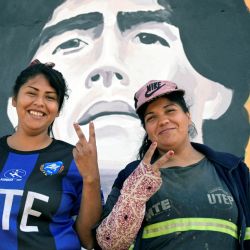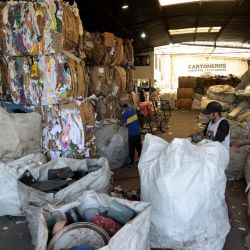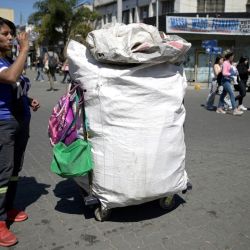With a rapid and steady stride, Ayelen Torres weaves her trolley expertly through the streets of La Matanza. With her friend Sabrina Sosa, the duo deftly gather recyclables in a cart, stopping every few steps to sift through trash in search of cardboard or plastic.
She is part of an army of ‘cartoneros’ – tens of thousands of poor Argentines who scour the streets for material to sell and put food on the table. The waste discarded by others is a treasure which will feed her children.
Poverty affects 40 percent of the population and is a central campaign issue in Sunday's presidential elections in Argentina, once one of the richest countries in the world a century ago but today suffering from annual inflation of almost 140 percent. The numbers of those turning to recycling are exploding.
"I feel like a heroine. You need strength and courage to dedicate yourself to this," assures Ayelen, 25, a mother of two girls who has always lived in La Matanza, whose million voters are coveted by the far right libertarian Javier Milei, the Peronist Economy Minister Sergio Massa and the conservative Patricia Bullrich.
Ayelen says she does not have great expectations of any of them. "Whoever wins, I’ll still have to get up at 6am to recycle scrap," she explains.
In a couple of hours, the two women dressed in dark blue vests identifying them as a part of their co-operative have gathered 76 kilos of material which will now be sorted at La Matanza’s recycling centre.
On a good day they can double that amount and also their pay in order to weather Argentina’s severe economic crisis.
"Cardboard is our daily bread," smiles Sabrina, 29, the single mother of a seven-year-old boy.
She’s three months pregnant, still working, and wants to continue working her way up in the cooperative, which she entered almost three years ago during the pandemic.
Previously Sabrina had worked at a pizza parlour, as a fair vendor and also as a babysitter, though never with a formal contract.
‘A beautiful job’
A mural of national football idol Diego Maradona guards the entrance to the centre of 700 square metres where around 120 persons work in shifts. A few blocks away the organisation also runs a child care centre.
Ayelen and Sabrina show up there five days a week in four-hour shifts to classify and pack. For that work they receive pay equivalent to half a minimum wage via the Social Development Ministry. The cooperative provides them with the equipment such as the cart, bags and gloves.
"This week stabilised my earnings. It’s the first time I have a recognised job. It’s decent work," explains Ayelen, who previously was a pedlar and now feels happy setting an example to her daughters.
"I think it's a very denigrated job but, at the same time, it's a beautiful job... what picking things up means, how it helps the environment. The strength you have to have, the courage, because in the street you encounter many things," says the 25-year-old.
The recycling material which she gathers in teamwork with Sabrina in La Matanza’s main shopping streets is sold by weight to their cooperative.
With different rates for glass, cardboard, paper, or plastic, the co-operative pays between 10 and 90 pesos per kilo.
In a good month, and counting on a small government subsidy, Torres and Sosa earn about 132,000 pesos (US$360) each – almost the minimum wage.
Since joining the Construyendo Desde Abajo cooperative (“Building from Below”), the two women are in the first formally registered jobs of their lives.
Resistance to acceptance
The cartoneros arose after the economic implosion of 2001 when the worst economic, social and political crisis in Argentina's recent history led authorities to freeze bank deposits, and deadly social unrest erupted.
The garbage recyclers initially faced fierce resistance from authorities and residents of the capital who didn't want them picking through their trash.
Twenty years later, there is a federation, the Federación de Cartoneros, Carreros y Recicladores (FACCYR), with 20,000 individual collectors who work for 145 cooperatives that buy the material and sell it on to the recycling industry.
The army of recyclers were joined by many more during the pandemic in 2020 and 2021.
"There was an entire social sector without resources. Many with informal and guaranteed jobs lost everything, their rights, a whole bunch of things," evokes Santiago Brítez, who has been a cartonero all this century and now oversees the recycling centre in La Matanza.
Nationwide there are over 150,000 people working today as cartoneros, according to the FACCYR union.
"The number keeps growing," says Brítez.
'Enormous challenge'
Buenos Aires Province Environment Undersecretary Jackie Flores recognises that in recent years "entire families appeared at the rubbish dumps with their children looking for food."
"It’s an enormous challenge," assures Flores, who for years was a cartonera and who promotes the installation of recycling plants to employ those who frequent the rubbish dumps.
The work and organisation of the cartoneros has been praised by Pope Francis, who was previously the archbishop of Buenos Aires.
"When you recycle, you do two things: a necessary ecological task and on the other hand, a production which fraternises and gives dignity to this work," he said in a 2013 message.
"For the first time I have a dignified job," agrees Torres.
"For May Day my elder daughter in school drew me with a cart of cardboard, writing: 'My mum works at looking after the environment'," she reports with a big smile.
related news
by Philippe Bernes-Lasserre & Nina Negrón, AFP























Comments